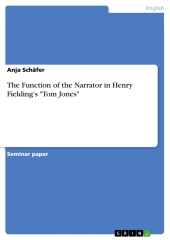 Neuerscheinungen 2012Stand: 2020-01-07 |
Schnellsuche
ISBN/Stichwort/Autor
|
Herderstraße 10
10625 Berlin
Tel.: 030 315 714 16
Fax 030 315 714 14
info@buchspektrum.de |

Anja Schäfer
The Function of the Narrator in Henry Fielding´s "Tom Jones"
3. Aufl. 2012. 24 S. 210 mm
Verlag/Jahr: GRIN VERLAG 2012
ISBN: 3-656-24543-6 (3656245436)
Neue ISBN: 978-3-656-24543-8 (9783656245438)
Preis und Lieferzeit: Bitte klicken
Seminar paper from the year 2007 in the subject English Language and Literature Studies - Literature, grade: 1,5, University of Trier, language: English, abstract: The following essay about Henry Fielding´s novel Tom Jones. The History of a Foundling (1749), deals with the author´s contribution to the development of the genre "novel", which had to prove itself as a potentially literary form in the eighteenth century century. By this time, prose fiction had to enforce its claim as a worthy pursuit and the form of the novel had to stand up to the dominant genres of verse and drama. Fielding was one of the first authors, who resolved to write fiction and with his humorous style of writing he revolutionized eighteen-century-literature.
In this context, the function of the narrator plays an important role, for he is responsible for the success of Tom Jones and for many complications of the plot. In the introductory chapters, preceding the individual Books of the novel, he presents himself as a deep thinker, discoursing on the philosophy of writing and foregrounding himself by intrusive comments and self-glorifying statements. What is told, the content of his story, seems to come second and the process of writing is centred as the "real" subject of the text.
Besides the narrator´s self-interest, his method of narrative selection causes much confusion, for he is constantly withholding significant information from the reader. In doing so, Fielding is leading his audience knowingly into the wrong direction, forcing it to make its own judgements and interpretations rather than trusting blindly in his guidance. The main function of the "games" the author is playing with his readers, is to strengthen their engagement with the text, forcing them to reconsider previous interpretations and judgements. Thus, the reader´s full attention is required throughout the whole novel and he is forced to pa


